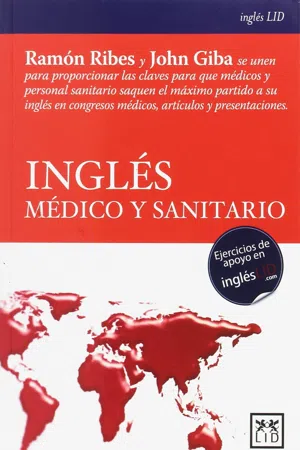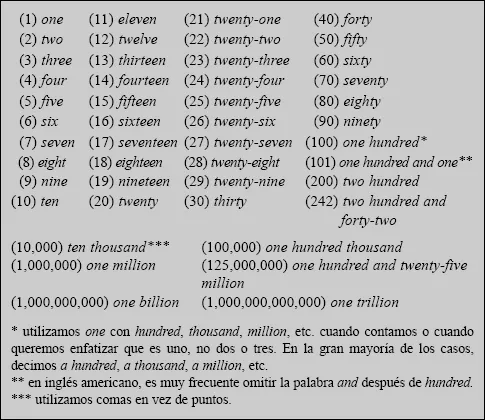
eBook - ePub
Inglés médico y sanitario
Giba John; Ribes, Ramón
This is a test
Share book
- Spanish
- ePUB (mobile friendly)
- Available on iOS & Android
eBook - ePub
Inglés médico y sanitario
Giba John; Ribes, Ramón
Book details
Book preview
Table of contents
Citations
About This Book
Ramón Ribes y John Giba se unen para proporcionar las claves para que médicos y personal sanitario saquen el máximo partido a su inglés en congresos médicos, artículos y presentaciones.
Frequently asked questions
How do I cancel my subscription?
Can/how do I download books?
At the moment all of our mobile-responsive ePub books are available to download via the app. Most of our PDFs are also available to download and we're working on making the final remaining ones downloadable now. Learn more here.
What is the difference between the pricing plans?
Both plans give you full access to the library and all of Perlego’s features. The only differences are the price and subscription period: With the annual plan you’ll save around 30% compared to 12 months on the monthly plan.
What is Perlego?
We are an online textbook subscription service, where you can get access to an entire online library for less than the price of a single book per month. With over 1 million books across 1000+ topics, we’ve got you covered! Learn more here.
Do you support text-to-speech?
Look out for the read-aloud symbol on your next book to see if you can listen to it. The read-aloud tool reads text aloud for you, highlighting the text as it is being read. You can pause it, speed it up and slow it down. Learn more here.
Is Inglés médico y sanitario an online PDF/ePUB?
Yes, you can access Inglés médico y sanitario by Giba John; Ribes, Ramón in PDF and/or ePUB format, as well as other popular books in Lingue e linguistica & Lingua inglese. We have over one million books available in our catalogue for you to explore.
Information
Topic
Lingue e linguisticaSubtopic
Lingua ingleseApéndices | |
- Los números
- Palabras que se confunden a menudo
- Falsos amigos
- Verbos irregulares
- Phrasal verbs
- Prefijos, raíces y sufijos de origen grecolatino
- Expresiones farragosas o vacías y tautologías
- La pronunciación
1. Los números
Los números son omnipresentes en todos los aspectos de la vida. Creemos que este tema es tan importante que merece una sección aparte. Empezamos con una revisión de los números cardinales y ordinales: remarcamos las diferentes maneras de expresarlos oralmente según la situación y destacamos algunas diferencias importantes entre su uso en inglés y en español. Acabamos con unas recomendaciones sobre cómo expresar los números en un manuscrito científico.
Los números cardinales (cardinal numbers):

Es importante recordar que the teens (13-19) se acentúan en la última sílaba, excepto cuando contamos; además de pronunciar la «n» final, es crucial marcar esta diferencia en la entonación para diferenciar estas palabras de los múltiples de 10.
No olvides que hay que poner un guión entre las decenas y los dígitos en los números compuestos entre 21 y 99, independientemente de que estén o no precedidos por centenares.
Notése que las palabras hundred, thousand, million, etc. no llevan ninguna «s» al final cuando hablamos de un número concreto. Sin embargo, cuando se utilizan como unidades para contar, sí que pueden llevar «s», por ejemplo: although it was once considered extremely rare, since the advent of CT and MRI, hundreds of cases of this malformation have been discovered incidentally. Otras palabras como dozen (12) o score (20) se pueden usar así también: I’ve seen dozens of patients with the same complaints this week.
A veces expresamos los números de cuatro dígitos como múltiplos de cien, por ejemplo: a visit to the emergency room can easily cost over fifteen hundred (1500) pounds. Los años se expresan con una modificación de este sistema: William Withering first described the use of digitalis to treat heart failure in 1785 (seventeen hundred and eighty-five o, más frecuentemente, seventeen eight-five). Con la llegada del siglo XXI, hemos empezado a hablar del año como 2001 two thousand and one. Sin embargo, los expertos creen que a partir del 2010 revertiremos al sistema anterior y diremos twenty ten.
También es muy frecuent...